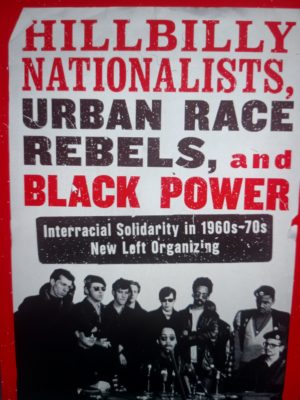by Chante Gamby, Contributing Writer
With a new introduction, epilogue, interview, and accompanying study guide, the 10th-anniversary edition of Hillbilly Nationalists, Urban Race Rebels and Black Power: Interracial Solidarity in 1960s-70s tells the little-known story of poor and working-class communities coming together across racial divides to fight for social justice. In addition, the book discusses how unlikely alliances were not only united under common goals but also advocated for systemic change across the United States.

Inspired by the Civil Rights movement, the Black Panthers, and progressive populism, the activists profiled in this book started to organize significant political struggles against racism and inequality during the 1960s and 1970s. Historians of the period have emphasized the work of White college activists who courageously took to the streets to protest the war in Vietnam and continuing racial inequality. Poor and working-class whites have often been portrayed as spectators, reactionaries, and racists. But in Hillbilly Nationalists, Urban Race Rebels, and Black Power, authors James Tracy and Amy Sonnie dismantle that narrative. James Tracy states, “I wanted this book to provide some concrete examples of what it looks like when White people make a genuine commitment to being an antagonist to White supremacy. When people ask if people should be in separate coalitions or not, the answer is quite easy-it depends on the conditions in your community.”
From the foreword to the conclusion, authors recount countless stories of the struggles of interracial solidarity in the 1960s-70s. The story begins from a perspective of a White college graduate in the 1960s, coming from a poor rural environment and marrying into a family that believed that poor Whites were to blame for racism in the United States. This story and countless other stories show how there was not only division within communities regarding racism but also within families. The book then dives into the “rainbow politics” that motivated these visionary alliances and how these alliances found a way to work together during a time that was already divisive.
This book also puts a spin on the perception of poor Whites during the Civil Rights movement, particularly within cultural aspects such as the term ‘hillbilly.’ Hy Thurman states, “The term ‘hillbilly’ was just a word in the south. To us, it was just a word. One of our goals was to organize White people. We were racist, but we were anti-racist because we began to see what was happening during the Civil Rights Movement. We still had that southern identity as a ‘hillbilly, but we challenged those who used it condescendingly.” These aspects helped both poor Whites and Blacks come together for a common cause at that time.

Instead of choosing to focus on the common narrative that White workers disregarded the plight of Black and Brown communities of the 1960s, this book instead focuses on the untold stories of poor Whites who also recognized that the “American Dream” was also not afforded to them, even in Northern cities. The book delves deeper into these inequities at work at a local level, mentioning experiences in various Chicago neighborhoods, such as Uptown, and across the country. Sonny and Tracy state, “Uptown in the Sixties belied the myth of the American Dream, and naturally social services agencies folded in with programs to uplift and appease the poor. By the mid-sixties, there were dozens of agencies vying for a share of the humanitarian good works” (page 15), something that we still see happening within urban communities, such as Chicago, today. The authors invite the readers to think critically about the social issues that groups were looking to address at the time, such as classism and racism, and the proposed solutions that may have also reinforced these issues.
Through over ten years of research and interviewing activists who gave them unprecedented access to their personal archives, Tracy and Sonnie tell for the first time the crucial story of five New Left organizations—giving us a book on White anti-racist action that was way ahead of its time. Their deeply sourced narrative history shows how poor and working-class individuals from various ethnic, rural, and urban backgrounds joined forces and drew strength from one another. These groups redefined community organizing and transformed the communities they touched. Hillbilly Nationalists, Urban Race Rebels, and Black Power is essential to our understanding of a little-known but pivotal moment in American history. Amy Sonnie states, “We came to the project as activists looking for stories and examples that could help us grapple around the contradictions of organizing around race and class and tackling those contradictions. So often, race breaks these coalitions apart. It looked like for a moment in history something else happened, at least for a period in time”. This book weaves stories of when “something else happened” during the time period, even those who may be least likely to be a part of this work, such as “a group of poor White guys-some former gang members-working alongside the Black Panthers and Young Lords contradicts biased notion about poor Whites as either hopeless racists or reliant on the Left intelligentsia for a radical reeducation” (p 102).
While the book may initially feel historically dense, the authors structure the book to be appealing to scholars, activists, and those who may have limited knowledge of the Civil Rights movement and social justice issues. Each reader is bound to find one aspect within the interwoven stories to which they can relate. As a result, the stories deliver a diverse set of knowledge that may be used as a tool to resolve issues that we see within our backyard today. This book also provides key insights into how locals with limited or non-existent experience could still organize and align with other social justice advocates to bring about the change for their communities. Overall, this book provides powerful lessons on the history of organizing in the United States during the 1960s-1970s. Still, most of all, it gives us a way to learn about our common humanity and to recognize ways in which we might come together, particularly during times that have traditionally torn us apart.
 About the Authors: Amy Sonnie is a librarian, educator, and author of the award-winning anthology, Revolutionary Voices (Alyson Books), which introduced the country to a rising generation of queer and transgender youth activism more than 20 years ago. As co-founder of the Center for Media Justice with Malkia Cyril and Jen Soriano, Amy helped build a national grassroots movement for digital inclusion and racial justice. She is the recipient of the Zoia Horn Intellectual Freedom Award for her leadership in public libraries and continues to be active in movements for social justice.
About the Authors: Amy Sonnie is a librarian, educator, and author of the award-winning anthology, Revolutionary Voices (Alyson Books), which introduced the country to a rising generation of queer and transgender youth activism more than 20 years ago. As co-founder of the Center for Media Justice with Malkia Cyril and Jen Soriano, Amy helped build a national grassroots movement for digital inclusion and racial justice. She is the recipient of the Zoia Horn Intellectual Freedom Award for her leadership in public libraries and continues to be active in movements for social justice.
James Tracy is the Chair of the Labor and Community Studies Department of City College of San Francisco. He is the co-author of No Fascist USA! The John Brown Anti-Klan Committee and Lessons for Today’s Movements (City Lights/OpenMedia), author of Dispatches Against Displacement: Field Notes From San Francisco’s Housing Wars (AK Press), and editor of Avanti-Popolo: Italian Americans Sail Beyond Columbus (Manic D Press). He is an organizer who has been active in groups such as the San Francisco Community Land Trust and Jobs with Justice, and the American Federation of Teachers 2121.
Roxanne Dunbar-Ortiz (Foreword) grew up in rural Oklahoma, the daughter of a landless farmer and a half Native American mother. She is Professor Emerita in the Department of Ethnic Studies at California State University East Bay, and the author of three acclaimed historical memoirs, in addition to books on indigenous peoples’, An Indigenous Peoples’ History of the United States, and most recently, Not a “Nation of Immigrants:” Settler Colonialism, White Supremacy, and a History of Erasure and Exclusion.
For more information on this book and other Melville Housing Publishing, please visit https://www.mhpbooks.com/books/hillbilly-nationalists-urban-race-rebels-and-black-power/.
Chante’ Gamby is a writer passionate about social justice and empowering others to live their best lives. You can follow her on Facebook at Fringefam, Instagram@fringegram, or on her website, www.fringefam.com.